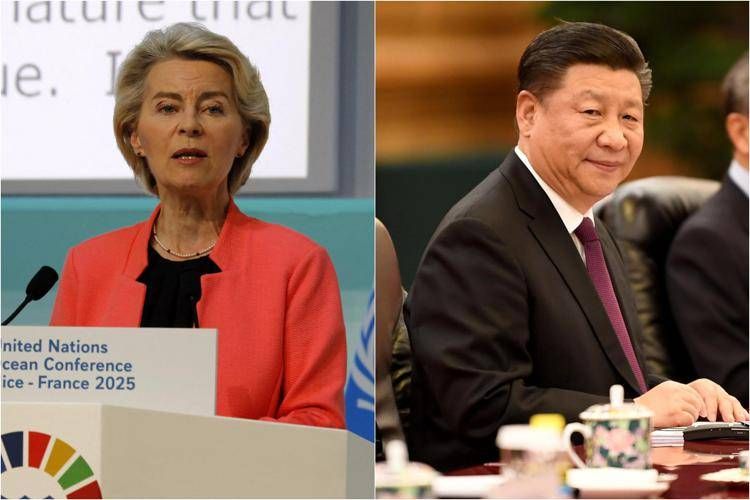
US tariffs, climate and global strategy: the EU moves closer to China
Von der Leyen and Costa in Beijing for the summit marking 50 years of EU-China relations. Between pressure from Trump and climate cooperation, Brussels seeks a new geopolitical balance
The aggressive economic policies of the United States and the tariffs promoted by Donald Trump are pushing the European Union to strengthen its dialogue with China. In this changing geopolitical scenario, Ursula von der Leyen flies to Beijing to celebrate 50 years of relations between the EU and China, meeting with President Xi Jinping.
‘In the next 50 years, we can write a new chapter,’ said the President of the European Commission, emphasising the strategic importance of rebalanced cooperation. Europe and China are now two of the three largest global economies, with bilateral trade exceeding two billion euros per day.
Climate and multilateralism: the basis for dialogue
Despite trade tensions and political differences, cooperation on climate remains the most solid common ground. Von der Leyen spoke of a “positive agenda” on the environment and green transition. The EU-China joint statement reaffirms the commitment to the Paris Agreement and the goal of limiting the temperature increase to 1.5 °C.
Brussels and Beijing have committed to presenting their updated climate targets for 2035 before COP30 and to strengthening cooperation on renewable energy, carbon markets and green technologies.
Xi: “We need the right strategic choice”
Xi Jinping welcomed von der Leyen and European Council President Antonio Costa with a clear message: “Faced with unprecedented global transformation, China and the EU must show vision and leadership”. The Chinese leader stressed the importance of “stable and solid” relations based on respect, openness and mutual trust.
Costa reiterated the need for ‘concrete progress’ on trade and market access for European companies, calling for an ‘honest and constructive’ dialogue.
Between cooperation and tensions: unresolved issues
Despite the agreement on climate, substantial friction remains. The EU issued its own statement at the end of the summit, a sign of unresolved differences on key issues such as:
- War in Ukraine
- Access for European companies to the Chinese market
- Tensions in the South China Sea and Taiwan
These issues, together with external pressure from the United States through tariffs and technological challenges, are pushing Brussels to balance its position between the two giants.
A new axis?
The EU-China summit did not mark a strategic alliance, but it confirmed a reality: in a multipolar world, Europe is seeking a new balance so as not to be crushed between Washington and Beijing. And climate leverage, in this context, is perhaps the most solid of bridges.
THE LATEST NEWS
(Photo: © AndKronos)
-

 International-News18 ore ago
International-News18 ore agoKhamenei assassination: surveillance and precision strike
-

 Flash18 ore ago
Flash18 ore agoDeliveroo Italy, convalidato controllo giudiziario per caporalato
-

 Primo Piano3 ore ago
Primo Piano3 ore agoMojtaba Khamenei Guida Suprema Iran, emergono cure per impotenza nel Regno Unito
-

 Meteo2 ore ago
Meteo2 ore agoClima primaverile in Italia con 20°C grazie all’anticiclone, attenzione alla nebbia




















